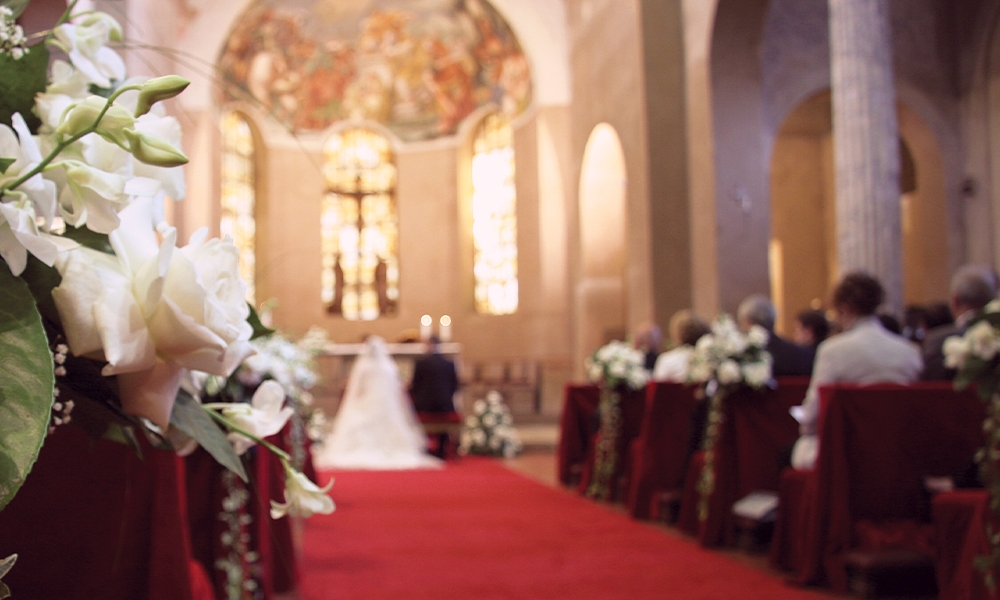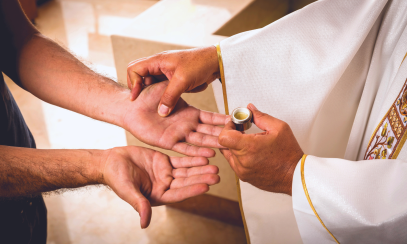
United in Christ: The Sacrament of Matrimony
Marriage and holy orders are sacraments “directed towards the salvation of others” that “confer a particular mission in the Church and serve to build up the People of God.” (Catechism of the Catholic Church 1534)
The sacrament of marriage signifies the union and love that exist between Christ and the Church. It is a faithful covenant in which a man and a woman unite in such a way that, by forming “one flesh,” they can transmit human life. As spouses and parents, men and women cooperate in a unique way in the Creator’s work.
Marriage and holy orders are sacraments “directed towards the salvation of others” that “confer a particular mission in the Church and serve to build up the People of God.” (Catechism of the Catholic Church 1534)
The sacrament of marriage signifies the union and love that exist between Christ and the Church. It is a faithful covenant in which a man and a woman unite in such a way that, by forming “one flesh,” they can transmit human life. As spouses and parents, men and women cooperate in a unique way in the Creator’s work.
This is the seventh post in our series exploring the seven sacraments of the Catholic Church. Check out a brief overview of all seven sacraments here.
Why do Catholics celebrate marriage as a sacrament?
Marriage has been a part of God’s plan since Adam and Eve in Genesis, uniting two souls in one flesh. Jesus taught about the sacred nature of marriage when he revealed to the Pharisees that Moses allowed the Jews to divorce because of the hardness of their hearts and that God always intended a husband and wife to become one flesh – that “what God has joined together, no human being must separate.” (Mk 10:1-9)
Who can get married in the Catholic Church?
A baptized man and a baptized woman who freely express their consent may enter into a marriage covenant. Being able to freely consent to marriage means that neither party is under constraint, nor are they “impeded by any natural or ecclesiastical law.” (CCC 1625) It is imperative that the man and the woman act of their own free will to enter into marriage.
In the case of mixed marriages between a Catholic and a baptized non-Catholic, or “disparity of cult,” the Church requires special pastoral care to ensure the validity of such a marriage. This includes educating the couple of the obligations of a Catholic marriage – “of preserving his or her own faith and ensuring the baptism and education of the children in the Catholic Church” – and commit to fulfilling them. (CCC 1635)
The man and woman are the ministers of the sacrament, conferring marriage upon each other by expressing their consent to live together as husband and wife before the Church. Ordained priests and deacons may assist at a Catholic marriage, serving as a witness of the Church and giving the newlywed couple the Church’s blessing. (CCC 1630)
What happens during a Catholic wedding?
Marriage is normally celebrated during the Holy Mass, connecting it to the sacrament: the Eucharist. Following the homily during a wedding Mass, a man and woman exchange vows in which they express their consent to be married, to live as husband and wife and be receptive to the fruits of marriage – children – who they promise will be raised in the Catholic faith.
The biblical basis for marriage
Marriage is mentioned all throughout the Bible, starting at the very beginning in Genesis, but this is what Jesus Christ himself said about marriage in Mark 10:6-9:
“But from the beginning of creation, ‘God made them male and female. For this reason a man shall leave his father and mother [and be joined to his wife], and the two shall become one flesh.’ So they are no longer two but one flesh. Therefore what God has joined together, no human being must separate.”



